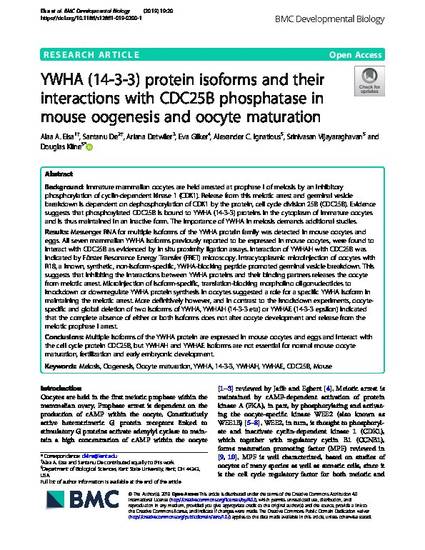
- Meiosis,
- Oogenesis,
- Oocyte maturation,
- YWHA,
- 14-3-3,
- YWHAH,
- YWHAE,
- CDC25B,
- Mouse
- Biology and
- Life Sciences
Background
Immature mammalian oocytes are held arrested at prophase I of meiosis by an inhibitory phosphorylation of cyclin-dependent kinase 1 (CDK1). Release from this meiotic arrest and germinal vesicle breakdown is dependent on dephosphorylation of CDK1 by the protein, cell cycle division 25B (CDC25B). Evidence suggests that phosphorylated CDC25B is bound to YWHA (14-3-3) proteins in the cytoplasm of immature oocytes and is thus maintained in an inactive form. The importance of YWHA in meiosis demands additional studies.
Results
Messenger RNA for multiple isoforms of the YWHA protein family was detected in mouse oocytes and eggs. All seven mammalian YWHA isoforms previously reported to be expressed in mouse oocytes, were found to interact with CDC25B as evidenced by in situ proximity ligation assays. Interaction of YWHAH with CDC25B was indicated by Förster Resonance Energy Transfer (FRET) microscopy. Intracytoplasmic microinjection of oocytes with R18, a known, synthetic, non-isoform-specific, YWHA-blocking peptide promoted germinal vesicle breakdown. This suggests that inhibiting the interactions between YWHA proteins and their binding partners releases the oocyte from meiotic arrest. Microinjection of isoform-specific, translation-blocking morpholino oligonucleotides to knockdown or downregulate YWHA protein synthesis in oocytes suggested a role for a specific YWHA isoform in maintaining the meiotic arrest. More definitively however, and in contrast to the knockdown experiments, oocyte-specific and global deletion of two isoforms of YWHA, YWHAH (14-3-3 eta) or YWHAE (14-3-3 epsilon) indicated that the complete absence of either or both isoforms does not alter oocyte development and release from the meiotic prophase I arrest.
Conclusions
Multiple isoforms of the YWHA protein are expressed in mouse oocytes and eggs and interact with the cell cycle protein CDC25B, but YWHAH and YWHAE isoforms are not essential for normal mouse oocyte maturation, fertilization and early embryonic development.
Available at: http://works.bepress.com/santanu-de/32/

©The Author(s). 2019
Open Access.
This article is distributed under the terms of the Creative Commons Attribution 4.0 International License (http://creativecommons.org/licenses/by/4.0/), which permits unrestricted use, distribution, and reproduction in any medium, provided you give appropriate credit to the original author(s) and the source, provide a link to the Creative Commons license, and indicate if changes were made. The Creative Commons Public Domain Dedication waiver (http://creativecommons.org/publicdomain/zero/1.0/) applies to the data made available in this article, unless otherwise stated.